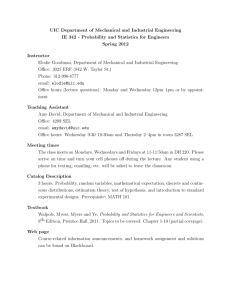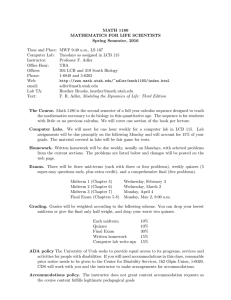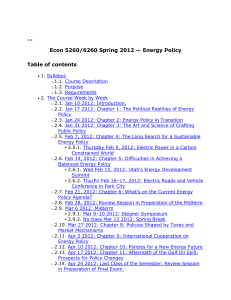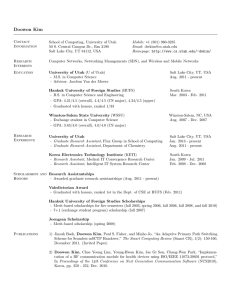History 1510-001 Spring 2016 World History, 1500
advertisement
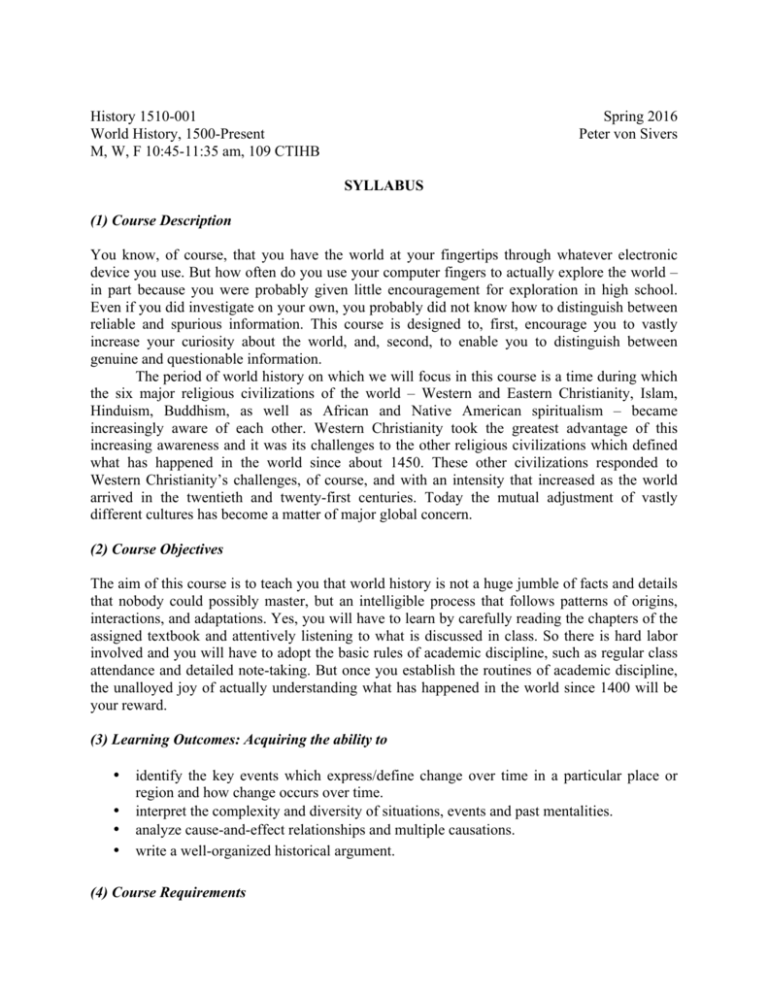
History 1510-001 World History, 1500-Present M, W, F 10:45-11:35 am, 109 CTIHB Spring 2016 Peter von Sivers SYLLABUS (1) Course Description You know, of course, that you have the world at your fingertips through whatever electronic device you use. But how often do you use your computer fingers to actually explore the world – in part because you were probably given little encouragement for exploration in high school. Even if you did investigate on your own, you probably did not know how to distinguish between reliable and spurious information. This course is designed to, first, encourage you to vastly increase your curiosity about the world, and, second, to enable you to distinguish between genuine and questionable information. The period of world history on which we will focus in this course is a time during which the six major religious civilizations of the world – Western and Eastern Christianity, Islam, Hinduism, Buddhism, as well as African and Native American spiritualism – became increasingly aware of each other. Western Christianity took the greatest advantage of this increasing awareness and it was its challenges to the other religious civilizations which defined what has happened in the world since about 1450. These other civilizations responded to Western Christianity’s challenges, of course, and with an intensity that increased as the world arrived in the twentieth and twenty-first centuries. Today the mutual adjustment of vastly different cultures has become a matter of major global concern. (2) Course Objectives The aim of this course is to teach you that world history is not a huge jumble of facts and details that nobody could possibly master, but an intelligible process that follows patterns of origins, interactions, and adaptations. Yes, you will have to learn by carefully reading the chapters of the assigned textbook and attentively listening to what is discussed in class. So there is hard labor involved and you will have to adopt the basic rules of academic discipline, such as regular class attendance and detailed note-taking. But once you establish the routines of academic discipline, the unalloyed joy of actually understanding what has happened in the world since 1400 will be your reward. (3) Learning Outcomes: Acquiring the ability to • identify the key events which express/define change over time in a particular place or region and how change occurs over time. • interpret the complexity and diversity of situations, events and past mentalities. • analyze cause-and-effect relationships and multiple causations. • write a well-organized historical argument. (4) Course Requirements 2 (a) Examinations: • Midterm: Monday, Feb. 22. • Final: Tuesday, May 4, 10:30 am -12:30 pm. • Four Multiple Choice Tests (unannounced) in the course of the semester. These tests will be one page long and contain five to six analytical questions concerning the reading materials and class discussions. One answer in each question is correct, four answers are wrong. A sample question will be available on WebCT. (b) Final Grade. Your grade in this course will be determined by the midterm (20 percent), the final (40 percent), and the multiple choice tests (10 percent each). (3) Course Format (a) Assigned Book. The discussions in this course will be based on Peter von Sivers, Charles A. Desnoyer, and George B. Stow, Patterns of World History, 2nd ed. (New York: Oxford University Press, 2015). Please read each chapter in this textbook during the weekend prior to the week when we will discuss them in class. Do not expect the week’s discussion to be a mere repetition of the chapter’s content. If you do not read you will not understand what is being discussed in class. (b) Readings. The questions on the Midterm, Final, and the Multiple Choice Tests will be formulated in such a way that you will not be able to answer them on the basis of the book alone. Nor will you be able to answer them by searching in Wikipedia and other popular Websites. Please set aside sufficient time every weekend to read the assigned chapter for the following week – this is the only way through which you will be able to master the materials of this course and receive a good grade. (c) Attendance. By regulation (6-100-III-O), the University of Utah requires your regular attendance throughout the semester. Except in the case of sudden illness or emergency, you are required to inform me beforehand of your intended absence so that we can arrange for you to catch up. If you repeatedly fail to come to class your final grade will be lowered to a C or less. You will not be able to pass this course unless you make it your habit to attend regularly every Monday, Wednesday, and Friday and take notes of what is discussed. Obviously, smartphones must be turned off and kept in your bag or pocket during class. (d) Missed Requirements. If you miss an exam without prior excuse you will be given an E for the exam. If you fall sick and are unable to notify me about missing the exam, I require a doctor’s attestation. (e) Contact Time. I will be happy to discuss with you any specific questions you might have in my office. The location of my office is 311 CTIHB (Tanner Irish Bldg.), phone 1-7083. My home phone is 801-364-3310. You can also reach me via email at peter.vonsivers@utah.edu. My office hours are M 1:30-2:30 pm and by appointment. 3 This course has a teaching assistant, Mr. Kurt Guner , whom you can reach in 310 CTIHB, phone 1-6121, or at kurt.guner@gmail.com. His office hours will be announced in class. (4) Course Schedule and Reading Assignments Week 1, Jan. 11-15 Part Four: Interactions across the Globe, 1450-1750, Chapter 16: Western European Overseas Expansion and the Ottoman-Habsburg Struggle, 14501650 Week 2, Jan. 20-22 Chapter 17: The Renaissance, New Sciences, and Religious Wars in Europe, 1450-1750 Week 3, Jan. 25-29 Chapter 18: New Patterns in New Worlds: Colonialism and Indigenous Responses in the Americas, 1500-1800, Chapter 19: African Kingdoms, the Atlantic Slave Trade, and the Origins of Black America, 1450-1800 Week 4, Feb. 1-5 Chapter 20: The Mughal Empire: Muslim Rulers and Hindu Subjects, 1400-1750 Week 5, Feb. 8-12 Chapter 21: Regulating the "Inner" and "Outer" Domains: China and Japan, 1500-1800 Week 6, Feb. 17-19 Part Five: The Origins of Modernity, 1750-1900, Chapter 22: Patterns of Nation-States and Culture in Europe and North America, 1750-1871 Week 7, Feb. 22-26 Chapter 23: Creoles and Caudillos: Latin America and the Caribbean in the Nineteenth Century, 1790-1917 Week 8, Feb. 29-Mar. 4 Chapter 24: The Challenge of Modernity: East Asia, 1750-1910 Week 9, Mar. 7-11 Chapter 25: Adaptation and Resistance: The Ottoman and Russian Empires, 1683-1908 Week 10, Mar. 14-18 Spring Break Week 11, Mar. 21-25 Chapter 26: Industrialization and Its Discontents, 1750-1914 4 Week 12, Mar. 28-Apr. 1 Chapter 27: The New Imperialism in the Nineteenth Century, 1750-1914 Week 13, Apr. 4-8 Part Six: From Three Modernities to One, 1914-Present, Chapter 28: World War and Competing Visions of Modernity, 1900-1945 Week 14, Apr.11-15 Chapter 29: Reconstruction, Cold War, and Decolonization, 1945-1962 Week 15, Apr. 18-22 Chapter 30: The End of the Cold War, Western Social Transformation, and the Developing World, 1963-1991 Week 16, Apr. 25 Chapter 31: A Fragile Capitalist-Democratic World Order, 1991-2011 (5) Official Notifications of the University (a) Disabilities. “The University of Utah seeks to provide equal access to its programs, services and activities for people with disabilities. If you will need accommodations in the class, reasonable prior notice needs to be given to the Center for Disability Services, 162 Union Building, 581-5020 (V/TDD). CDS will work with you and the instructor to make arrangements foraccommodations.” (www.hr.utah.edu/oeo/ada/guide/faculty/) (b) Accommodations. “Some of the readings, lectures, films, or presentations in this course may include material that may conflict with the core beliefs of some students. Please review the syllabus carefully to see if the course is one that you are committed to taking. If you have a concern, please discuss it with me at your earliest convenience. For more information, please consult the University of Utah’s Accommodations Policy, which appears at: www.admin.utah.edu/facdev/accommodations-policy.pdf.” (c) Academic Conduct. This course is covered by all applicable paragraphs of the University Regulations and you are held to their applicability, especially to the sections on plagiarism (University Regulations 6-400).




